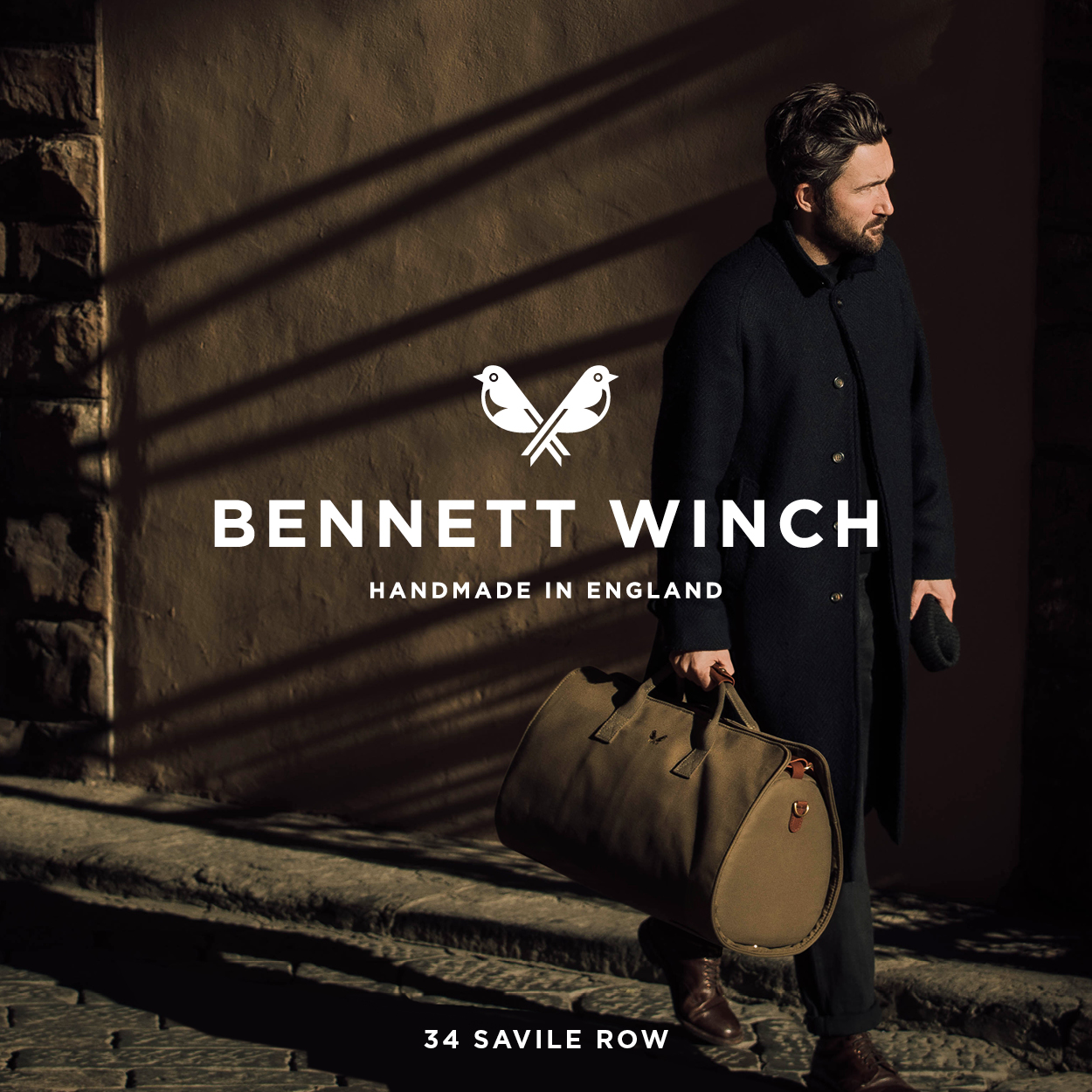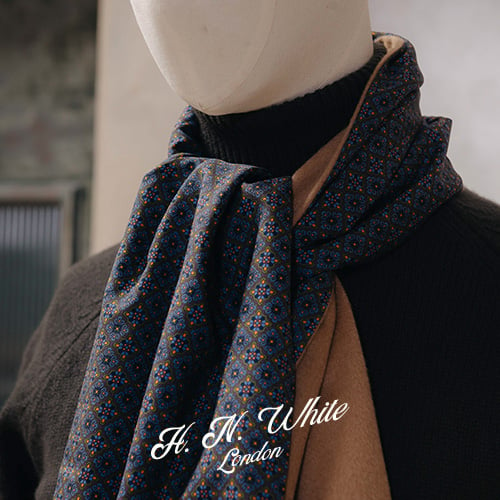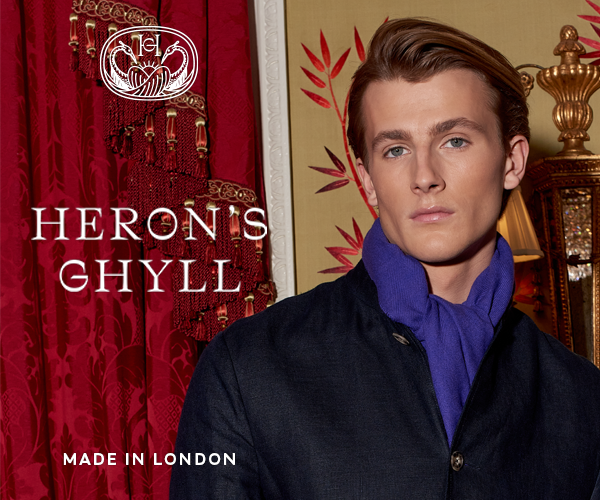Brut Archives, Paris: Evolving vintage

Brut is an interesting French brand, and store. Since it was founded by Paul Ben Chemhoun (below) in 2012, it has evolved from a vintage shop, into a home for rescued and reworked clothing, and now its own brand.
When I visited earlier this year with Alex Natt and Tony Sylvester, on a warm Thursday afternoon, the place was buzzing. It’s not exactly in a fashion location - the 3rd arrondissement, but a few blocks north of the Marais - yet there were seven or eight customers in the small shop, plus five staff.
“We’ve acquired this reputation for being quite affordable and quite forward-thinking, which seems to bring people in,” said Paul. “This used to a wholesale jewellery store, but there’s more and more retail around us now - a skate shop just opened down the road.”
That reputation has largely been driven by Brut’s ‘Rework’ programme, where they take old vintage clothes that no one wants, and turn them into something new.
“The best example is probably the 1950s French chinos,” says Paul. “We had hundreds of pairs, but all size 36. The material was so great, and so was the hardware, so we cut them down and both gave them a modern fit and created a range of sizes.”
Quite a lot of the Rework pieces are too streetwear, or perhaps just too unusual, for me.
The gilets made out of old made-in-USA blankets, for example (below), are a random patchwork of red, yellow and blue stripes. And their most recent release is a range of trousers made out of US Mint coin bags - each featuring descriptions of their original contents.
But resizing the French chinos makes complete sense (second image below). Material like that is really hard to find today, and vintage examples are often in unwearable conditions or sizes. It’s also a step deeper into sustainability - not just reselling clothes, but remaking ones that won’t sell.
Brut’s most popular project was reworking unwanted Barbour jackets into shorter versions - more of a fishing-jacket length (third image). And some ranges have been closer to intensive repairs, like the ones Ben at Hang-Up Vintage (sadly now only online) has done over the years. These included French workwear trousers made out of cutting down overalls.
Let’s briefly go back to that evolution of the brand though.
Paul grew up around vintage, and early on began collecting vintage clothing and then selling it. Eventually this grew to the point where - as often seems to happen with vintage dealers - his collection was something designers and researchers would want to examine and borrow from.
This was separated off into Brut Vintage Archives, and today has its own showroom (top image below).
Then three years ago a team of three of them opened the shop, mostly selling vintage. Over time the Rework programme grew, taking over rails in the shop until now, when you visit, almost half of what you see on Rue Réaumur is reworked pieces.
But it’s about to be changed again, with the vintage clothing moving downstairs and the ground floor becoming entirely Rework and Brut-branded clothing. They’ve also increasingly done collaborations with brands.
This is all reflected in the website, which has been redesigned since we were in Paris. There are now separate areas for ‘Brut Collection’ and ‘Rework’, as well as for Vintage and a specific area for Army surplus (though some areas do overlap).
“It hasn’t been easy for the website to keep up, as we’ve expanded and changed,” says Paul. “We were three people when we opened the shop, and now there’s a staff of seven. But hopefully the new site makes everything easier to understand.”
Personally I think it’s really refreshing to see a brand evolve in this way. Vintage shops in particular can get into a bit of a rut of dealing with the same ageing customers and going down rabbit holes of rarity.
It’s great that the vintage side remains at Brut (I picked up an orange down gilet when I was there - the vintage selection is a little more modern and broader than somewhere like Le Vif) but the team is branching in different directions every few years too.
Whether it’s driven by financial necessity or a restless creativity doesn’t really matter. Given the state of retail at the moment, I think it just pays to remain flexible and open-minded. It might mean selling some vintage clothing as well as new, or hosting a particular set of trunk shows, but it’s the attitude that matters.
It’s particularly easy for menswear stores to get locked into a certain approach and a mindset, given their fairly narrow range of styles and categories of clothing. As a customer and a commentator, its energising to see something other than new collections change.
Thank you to Paul, Clement and the team for their hospitality.
Clement (pictured above, far left) runs his own brand content business, Crafted Paris, which is responsible for a lot of the great imagery Brut has produced. Some examples I particularly like below.
Photography elsewhere: Alex Natt @adnatt











































“We’ve acquired this reputation for being quite affordable and quite forward-thinking” – While I agree on the latter, the former made me laugh out loud on the train. It’s a cool shop and I always enjoy popping in to see what new piece they have, but those ain’t cheap for sure. (I appreciate they need to pay staff and rent but still)
Thanks for heads up on the new website, seems well designed.
Interesting and creative shop, though stylewise not really for me (those Barbour jackets look like fishing gear?). Regarding the French chinos, you state that “material like that is really hard to find today” – is that really so? Isn’t this just some generic heavy cotton twill – like this, new, and responsibly made, for half the price: https://www.asket.com/fr/mens/trousers/heavy-twill-chino-beige?
I like the idea of re-using and upcycling a lot, but like the 400 EUR sneaker refurbishing service you recommended a while ago, I don’t think this is really a proof of concept from an economic point of view.
Yes, part of the point of those Barbours is that they are more of a fishing cut.
And yes, I’m afraid it is so. Just because something is heavy, cotton and a twill doesn’t really say very much about the quality. Rather like the piece we recently did on denim – chino cottons don’t have the issues with dyeing, but the quality points remain.
I think that’s something that has hopefully come across in the pieces we’ve done looking at chinos – all the Clutch brands, the McCoy’s ones, then the Rubato and so on. If you saw a Fox flannel and then another one that was 10% of the price, you’d never assume they were the same quality. But with cottons people do.
Great article! I think the Brut styles are an interesting Inspiration.
I had to think of the Casatlantic chinos seeing the vintage French chinos. How do you judge the cloth Casatlantic uses compared to the Brut chino/McCoy’s chino?
It’s hard as I haven’t tried all the fabrics from Casatlantic – I’ve tried three, but they use quite a few.
Of the ones I’ve tried, the white twill was the closest, but still it really wasn’t as tough or strong as any of the other more workwear ones we’ve looked at.
Hi Simon
You’ve regularly made the point that you won’t cover provincial bespoke tailors in the UK because they are not accessible to the majority of your readers.
Why, then, do you feature a French business which, without doubt, would only appeal to a very narrow range of readers?
Thanks
Hi Dave,
In terms of access, everything from Brut can be bought online, so not that similar there. And in terms of style, I simply write about what I like. Sometimes it has broad applications, sometimes narrow. Sometimes it’s a Japanese knife maker that you can’t really buy anywhere.
That’s fair, Simon, thank you.
But if PS is about luxury and the best available, why promote a business that charges 425 euros for trousers made out of old coin bags?
No worries.
I think it would be a little odd to only write about shops where you liked every piece of clothing they sold? As mentioned the coin bags and other pieces are not for me, but it would be a little narrow minded to dismiss the rest on that basis, and I’m glad I didn’t.
It’s an interesting shop for inspiration if you ask me. Nice to read about it. However, if you think this is affordable than I wonder where you have been shopping the last couple of years . I bought the 1950 French Chino years ago for 20 euros and had then tailored for 40 euros. There is really no fun in vintage or military clothing shopping if it’s so expensive. For me it’s was always a way to buy something unique for less.
Yes, perhaps they were overstating that Jasper. Though I think your point at the end is a relevant one – there are different kinds of vintage shops, and with the more expensive you’re paying for someone to do all the hunting for you. That’s fine if you have less time and more money, but others may have less money and more time – and as you say, simply enjoy that hunt themselves.
It also probably makes a difference that those kinds of chinos seem to be rarer today than they were.
These particular styles on images are not for me but I’m glad that all these items are getting a second lease on life and a little less waste is created. I think this should be the bottom line. All the power to them for trying to make recycling cool.
In the attached photo, I think there’s only one guy (Simon Crompton) who looks well put-together, and genuinely “himself.” It’s probably just me – but everyone else seems like they’re trying too hard to look like something they aren’t. Or – just maybe – they don’t yet know what their style is as some of them seem to be floundering. I lived in Brooklyn for a while, and was there for the 2nd wave of hipsters who dressed (to some extent) like this. It feels like a sub-culture that pays a ton of money to appear as people who aren’t trying at all, broadcasting to onlookers that they don’t care about their overall style (when they care massively). The Barbour coats really get to me — it’s something I’ve said before about how some of this is a kind of sartorial cosplay (and fetish) and overpaying for things that don’t really flatter the wearer (old, boxy or odd-fitting, or recut weathered cotton jackets with big price tags). Barbour waxers – or Moncler puffers – or Canada Goose parkas seem to be (for a lot of wearers) just signifiers of wealth or alleged style. They signal “good taste” – you can shrug in and out of them without really thinking about what you’re wearing. And, in some cases, the explanation is that they’re worn “ironically.” Paul’s own trousers? I’d resize those. Simon’s trousers? They’re a perfect fit. They make his legs long and streamlined. Paul’s pants? They make him look a bit stocky and disheveled as opposed to louche and, well, timeless. But maybe this is what being counter-culture is all about: to be part of that group, one must lie just outside of what’s expected, accepted, or carefully curated. But by offering others a carefully curated selection of this stuff, it seems at odds with itself.
I think it’s worth remembering that these are principal enthusiasts of this style and approach to clothing — it’s their life. Just as tailoring enthusiasts are always (I imagine) going to have perfectly proportioned shoulders, lapels, and buttoning points, and a wide range of fabrics, Paul and co. are going to have the most wild combinations because they’re at the cutting edge of exploring this style (whatever it’s called). Most people would (hopefully) find their own unique place in the massive spectrum of clothing, and so wouldn’t necessarily take it this far.
I’ve seen boxy jackets and baggy trousers look great on people, and I’ve seen them look terrible. I think some of these look great in the pictures; the proportions are actually on because they’re using different metrics than a tailor would, to create a different effect. I’m not sure what it’s like wherever you are now, but in my hometown and nearby current city, people who attempt this almost delve into straight-up clownery — because they don’t actually know what they’re doing, just copying what they see on social media, the proportions don’t even conform to the alternative standards, let alone mainstream ideas of tailoring. Sidenote on alternative/mainstream metrics of style: It’s honestly questionable at this point which is which. I would say that both sides are alternative, because to be truly “mainstream” is to just not give a s*** what you wear.
Those Barbours look proportionally good to me, but you’re right in that the only real reason to wear a fishing jacket in the city is to try to convey a certain aesthetic idea that is devoid of function, and therefore not actually connected to the world around them (further exasperated by SM). On that note, I wholeheartedly agree with your last sentence. There’s probably a point where the amount of money and care being put into not caring passes through to the other side and it becomes detached from reality. Maybe I’m interpreting all this too far in one specific direction, but that particular element of it really does irk me, and it’s why I avoid purchasing pieces like that without having a really good reason/connection to them.
Good points Dante. It’s always dangerous to just dismiss other people’s style
That certainly can be dangerous (and I can think of some things, politically, in Paris that speak to that danger), but my goal wasn’t to dismiss someone’s style.
My observations and conclusions here had to do with “the net effect” of our collective and individual dressing. Anyone is welcome to “their style,” but that doesn’t mean it actually works for them (does it actually look good, does it actually serve their daily functions, what even are their daily functions, etc.?), and it also doesn’t mean it works for others around them.
There are some pieces you’ve had commissioned or purchased and displayed on PS that felt (to me) like costume (that duster coat you featured was a real throwback to 100 years ago and the wild west, or perhaps Dickensian London, or maybe looking towards a time that Morpheus broke us out of The Matrix), but your pieces are coherent and cohesive: they coexist, and they exist (unto themselves). You often look overdressed to me, but you never look ill-dressed. Even when many PS readers knit-pick a hem length or a shoulder or some aspect of a bespoke suit that didn’t photograph perfectly, you still look appropriate and well put together and considered.
It’s not dismissing someone’s style to say: his pants are both too short and too wide and make him look disheveled (vs. louche). And they are, and they do. It’s constructive criticism. Did anyone else notice that you, Simon, are the only one smiling in that store-front picture? You’re the only one who looks happy or contented or fulfilled. Now, that smile metric is pretty objective. But you are happy, in actuality. Your posts and your attitude support that claim. And your clothes are a reflection or extension of that.
The entire point of this blog, I’d hazard, is to weigh in, engage, judge, and consider. That’s not the same as dismissing. My instinct is to find points of comparison: this crew is no different than Brooklyn hipsters. I lived through those shenanigans: $500 grandpa sweaters at Beacon’s Closet in Williamsburg. $1000 recycled YSL (licensed in name only) 80s suits with deliberate paint splatters at boutiques that had 7 items of clothing in them, and the like.
It’s hard to understand what it means to create a movement or a lifestyle, when it’s really just people “re-creating” a lifestyle or movement that has already happened elsewhere, many times, in many places.
And while “I don’t get it,” I do love clothing. I think about clothing far too much. I spend too much on clothing. But – in the end – I want my clothing to accomplish three things:
ONE: Help me express my best self to the world (a manifestation of who I truly am)
*TWO: As much as possible, have the world see it that way too…
THREE: Work for the life I actually live, and allow me to be productive on my terms.
*And to number two’s point: we are part of the scenery.
{Final thought: Jennifer Wright, among thousands of others have said…
“Every time you get dressed remember that, if you die, that’s your ghost outfit forever.“}
Thanks Wes. I do get your points, but I still think you’re dismissing other people’s approach to clothing. You know why I like my clothes from reading articles about them, but you don’t know anything about this person or their style. You’re bundling them up with others you’ve known and making assumptions about why these people you’ve never met dress in a certain way.
I also think the point about being happy or fulfilled is a little silly. Sorry. Plenty of people smile and aren’t fulfilled, and vice versa.
Wrote “objective” — meant “subjective.” Not sure how I made that mistake.
Also, going back and reading the blog shows that even within the world of tailoring, Simon has spent over a decade on this journey of genuine expression of self through style. Perhaps some of these folks just need good influences and a few more years of trial and error.
All this comes down it is ‘I don’t like the look’ rather than your long and prose on the essence of style.
Hello Simon. I found this https://brut-clothing.com/collections/us-army-highlights/products/1950-s-us-wool-shirt?variant=41726003609781. I intend to wear this as an overshirt in winters with my navy/white PS Tapered/Japanese tees and my Real McCoy’s Blue & The Armoury’s Indigo jeans. Please let me know your thoughts on this piece of clothing?
The collar looks rather big Amit, as was the case on a lot of those Army shirts. I’d think about whether that might be too large for you
I appreciate all their upcycled clothing. My biggest problem with stores like these (and Broadway&sons for example) is that much of their milsurp clothing is too overpriced. I can find the exact same army trousers that they sell for €60 at the local army dumpstore for often under €10. Which makes me wonder a bit how they come up with these prices?
I don’t think that many people have a local army dumpstore, and it certainly doesn’t have an online presence.
It takes a good amount of time and money to be able to provide that kind of access to those products. Plus, in my experience, a good amount of that dump of clothes will be bad – damaged, too stained, whatever. You buy from a shop, you’re paying someone to sort through all of that and find 10%. I’m quite happy to pay someone to do that – I don’t need so many trousers that €50 makes a big difference.